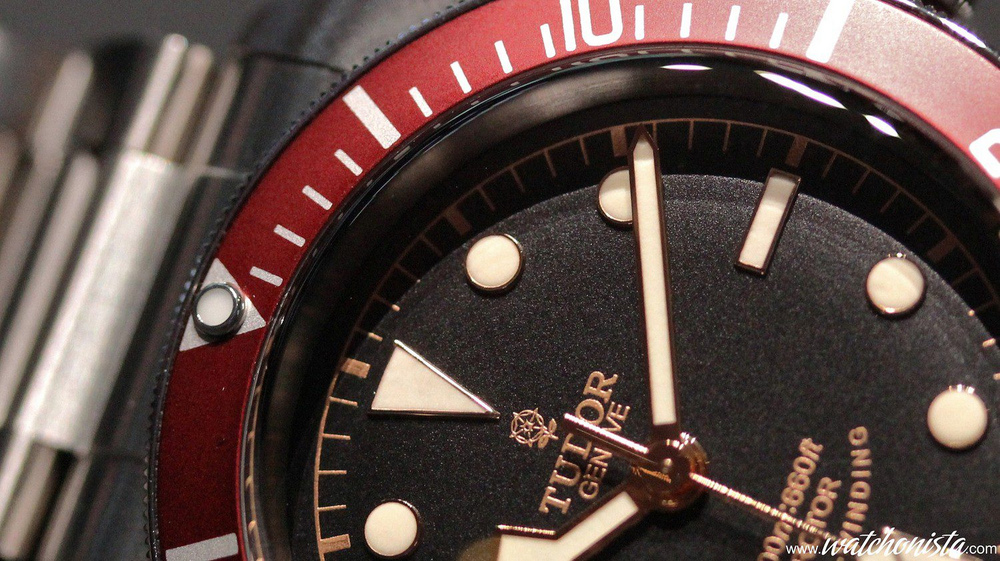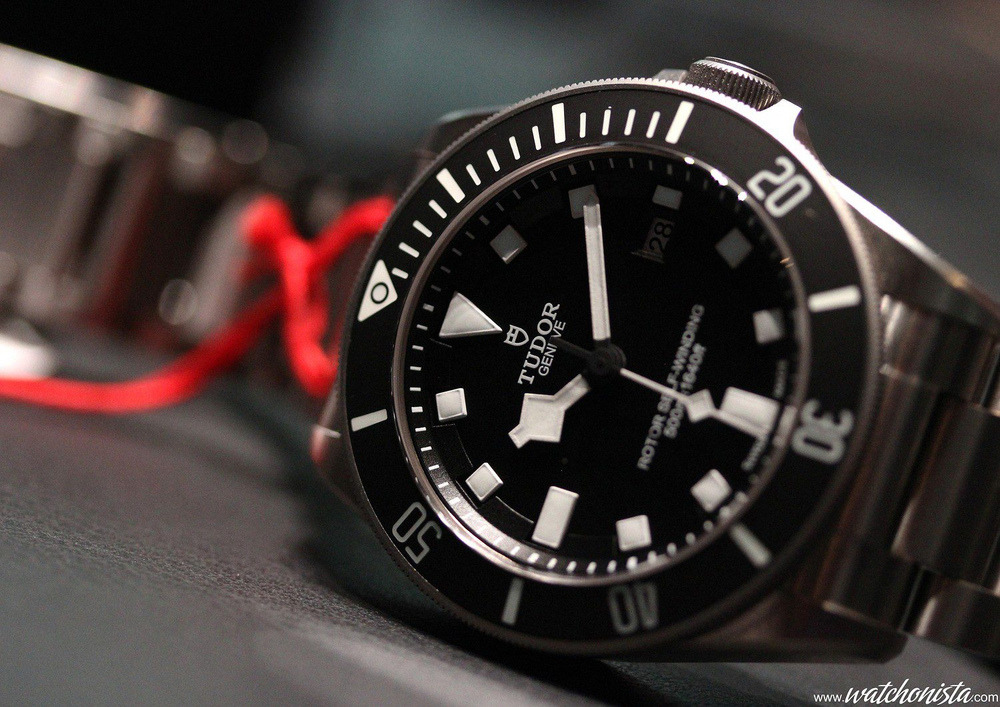At the beginning of each Baselworld, the commentators frenetically split their attention between two booths: Rolex's and Patek's. Yet, in order to see the 2012 edition's future best-sellers, one only had to slightly turn one's head to the right when facing the Rolex booth. Indeed, even if the Tudor booth is absorbed by the impregnable Rolex bunker, the novelties presented by Tudor were the focus of all the photos and of all the attention. Therefore, the excellent "Heritage" chrono presented in 2010 was not a "single-shot", which only confirms that the Tudor creations are "laboratory tests" for the Rolex group.
Let's say it straight out: it is the greatest hit of Baselworld 2012. Tudor not only presented The most attractive watch of the trade show, but the two most attractive, at least in the affordable category. You know this category of watches which is not divorce-inducing in case of a compulsive purchase. I'll let you determine which one is the best, according to your tastes.
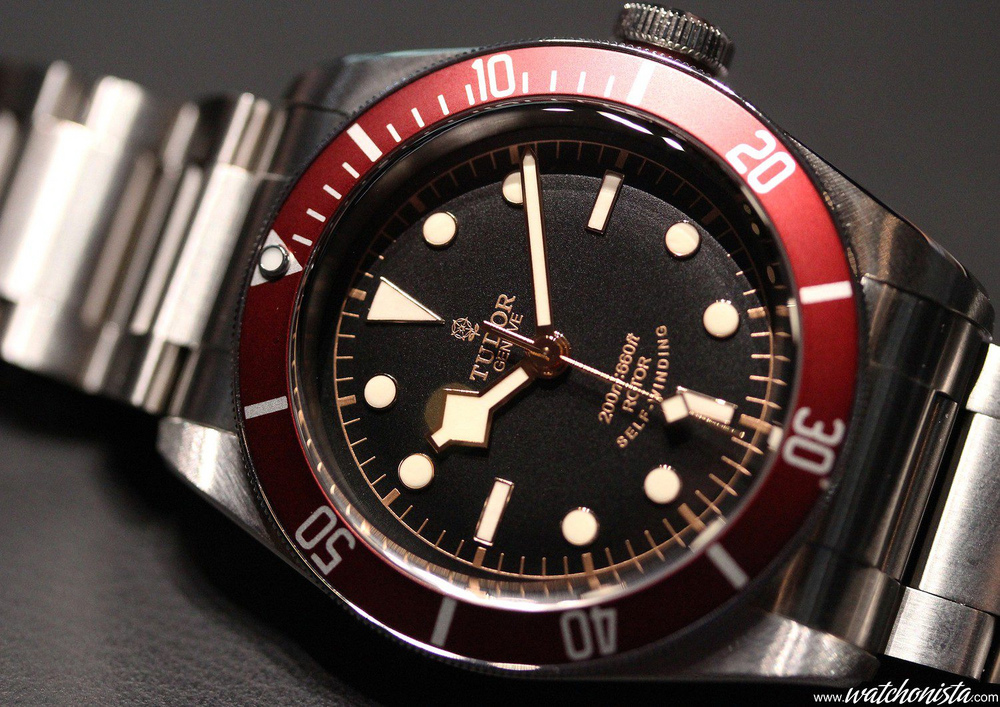
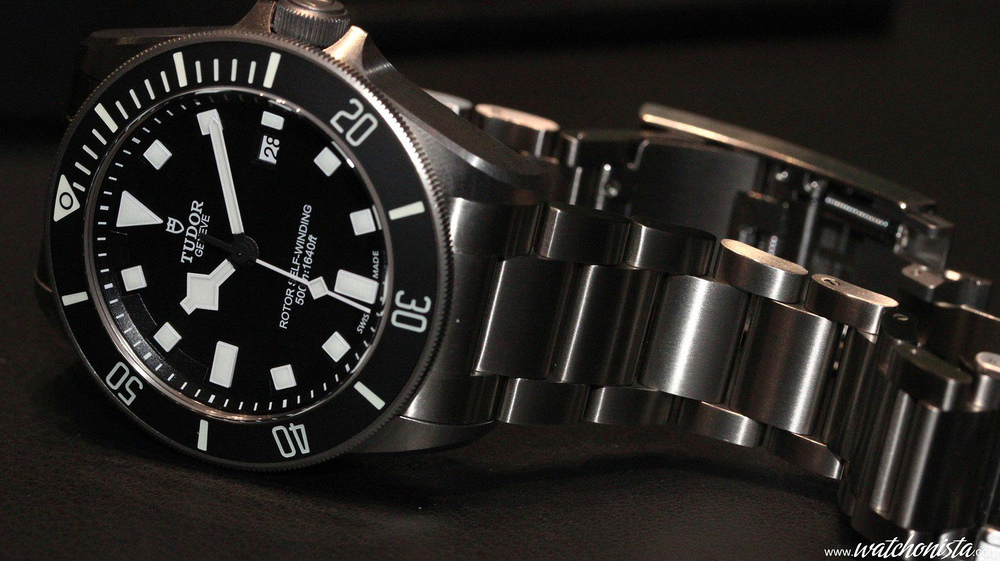
The question is: why?
In order to understand the success carried by these products, one has to understand the Rolex myth. Since I am not a specialist of Rolex, I will describe it from an ignoramus' standpoint.
The mythology of Rolex was popularized by another myth, that of the James Bond played by Sean Connery.
Rolex is the legend of the Alpha man from the 50's-60's. Adventurer, sports man, but also gentleman which remains virile, in short, the last example of the complete man from the XVI-XVII centuries (the "gentilhomme", poet, philosopher, swashbuckler and womanizer).
This myth of the exploration, of the last geographical conquests (the deepest dive, in the Mariana Trench, the highest climb to the top of Mount Everest), but also of the spies, was the foundation of the Rolex passion. (Spies are the main theme of the excellent movie "Killer Elite" that takes place at the end of the 70's, in which Robert de Niro and Jason Statham both wear the Rolex Submariner 5513 or 1680).
One has to admit that many marine commandos were equipped with Rolex throughout the 50's-60's period, outstripping Panerai, even though this brand was the historic provider for the Axis' combat divers.
Rolex for the most expensively equipped divers, but also Tudor, for more thrifty army corps.
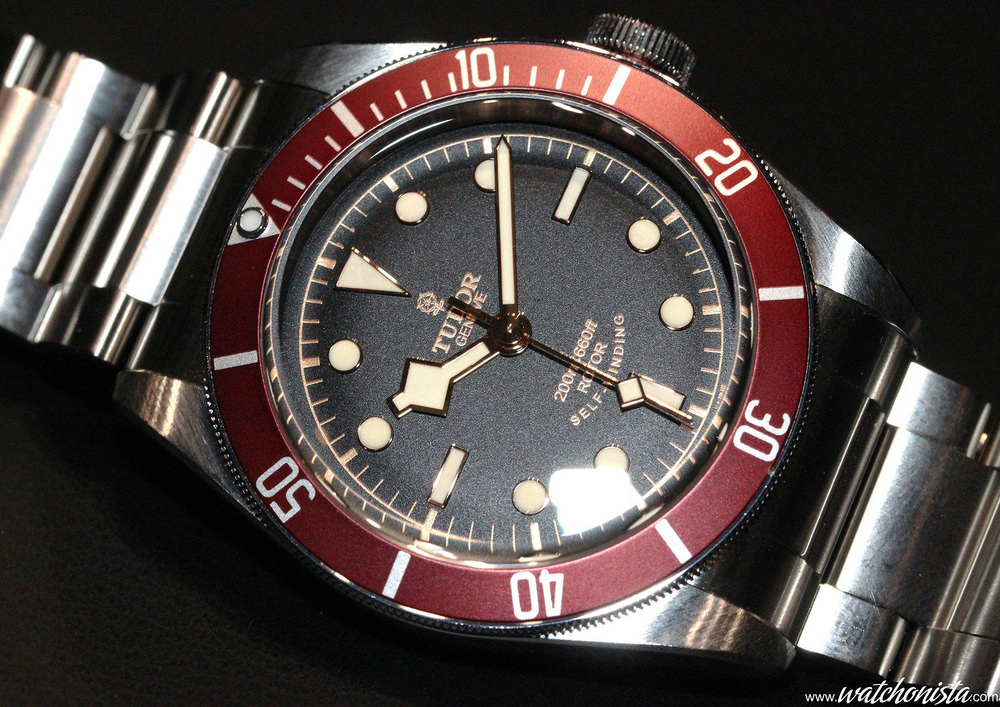
For the Rolex & Tudor purists, the ideal watch is functional, waterproof, legible, compact, and it preserves the elegance of the curved shapes from the 50's.
Yet, since the industry gradually gave up using tritium and painted dials during the 80's, some of the Rolex fans on the web are frustrated, as the will to reach the "Zero flaw quality" sometimes led Rolex on the path of gentrification.
Against all odds, this year it is Tudor, the "affordable" subsidiary of Rolex, which presents two watches true to the "adventurous" spirit from the 50's. Even if these two watches are totally different in terms of design, they satisfy the same technical specifications: producing dive watches conforming to the criteria of the Submariner's original commercial success. On the one hand, the engineers inspired themselves from the 50's-60's period, and reproduced as faithfully as possible a military dive watch. On the other hand, they turned toward the future and created a mechanical dive watch as modern as possible but satisfying the exact same criteria.
First of all, the most desired? Longed for? Wanted? The Tudor Black Bay.
It is definitely inspired by the Tudor 7922-7924 from the 50's; this watch, with a professional or even a military purpose, featured a blue bezel, and more rarely a red one.
The case also has a vintage look: "Big Crown" without flange and metallic bezel insert, domed sapphire crystal (the vintage's look without the Plexi's shortcomings). The lugs are rather thin from the front view, but they are a bit too thick when seen sideways; therefore, they look too modern, it is an inconsistency we already noticed on the "New Migauss".
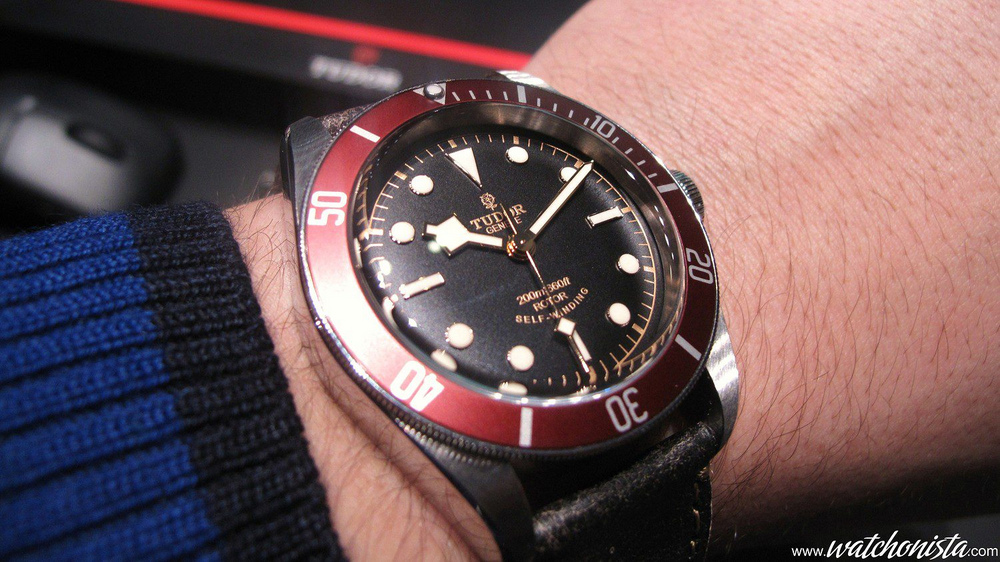
In order to understand the dial, one has to talk about the bezel; remarkably, the Tudor team chose to revisit the red version. It will take a while for the blue model to be available. This choice of color enhances the dial's gilt font. While it is shocking to some, it is well suited for the "brand with a crown", especially considering the success met by the green bezels from Rolex. But most of all, after hundreds of gallons of vintage Pepsi, Tudor crosses the sparkling soda's Rubicon, and at last proposes the Coca-Cola Rolex; excuse me, the Coca Tudor.
The watch's appeal comes from its warmth, from the combination of the gilt hands, indexes and font, sitting on a domed dial and associated with the red/burgundy bezel. All of this provides the watch with the warmth of a peplum shot in Technicolor.
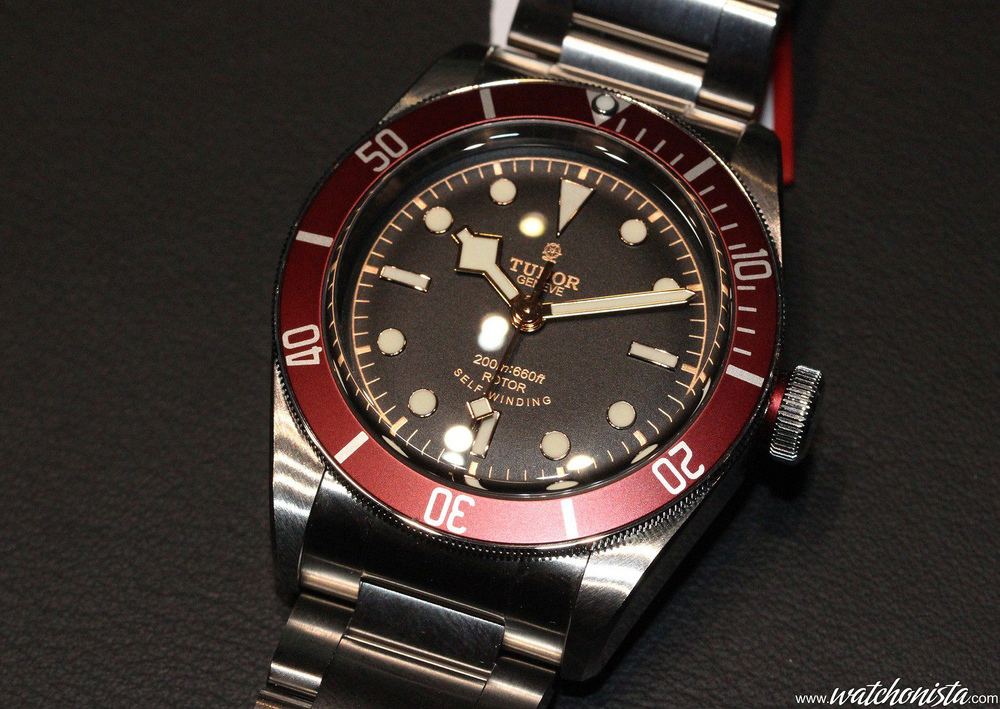
As described in the press kit, the dial is black, but if I trust my eyes and my EOS 60D, it looks slightly brown, as if it had been exposed to imaginary radium. Or perhaps the SuperGilt (© Watchonista) indexes/font/hands visually beam on the overall dial…
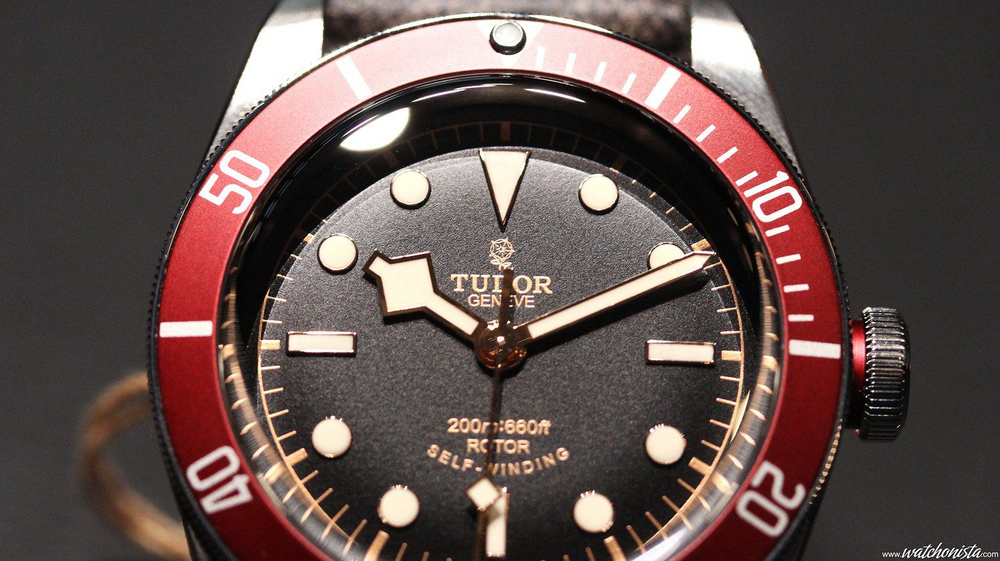
In the Tudor purist's opinion, the watch should not feature Snowflake hands, as they don't match historically this kind of indexes (it should feature double pencil hands)…. As well as some other details, such as the red insert that sits between the bezel and the casing (which is not terribly shocking when one holds the watch in one's hand).
As always, the criticism is easy, but the art is difficult. For example, today, one of the rare almost successful attempts at redoing a Neo-Vintage watch is the Jaeger leCoultre Polaris.
This watch is almost identical to the vintage model, yet, it has a few flaws that tend to prove that succeeding in this area is almost impossible (?): the watch is relatively cold, the "Vintage Luminova" indexes are over worked, but most of all , the price of about 12.000€ is absolutely outrageous . Hence, if the expertise used on this vintage Polaris is quite impressive, the final result is a bit disappointing. Comparatively, the Tudor Black Bay, or some Neo-Vintage Panerai are far more entertaining and are priced according to the quality of their movements, even if they are not perfect reproductions of the original models.
Today, wanting to perfectly reproduce the glorious "oldies" is utterly useless:
-The brand's internal policies, and especially that of the groups, forbid certain things; for example, it seems that the Mercedes hands (which would match the indexes better) are obviously reserved for Rolex.
-The everlasting level of quality increased enormously since the 50's-60's: a lot of patinas and weathered bezels were inherent to the manufacturing flaws of this period.
-The processes became more industrialized, and the manufacturing techniques from this era have been forgotten.
-The fact that the uses of Radium and Tritium have been successively forbidden prevents the indexes/dials from aging quickly.
-Nobody owns the "watch aging machine", especially since the process is inherent to its original buyer (CF the article on the PAM382 "Gonzo").
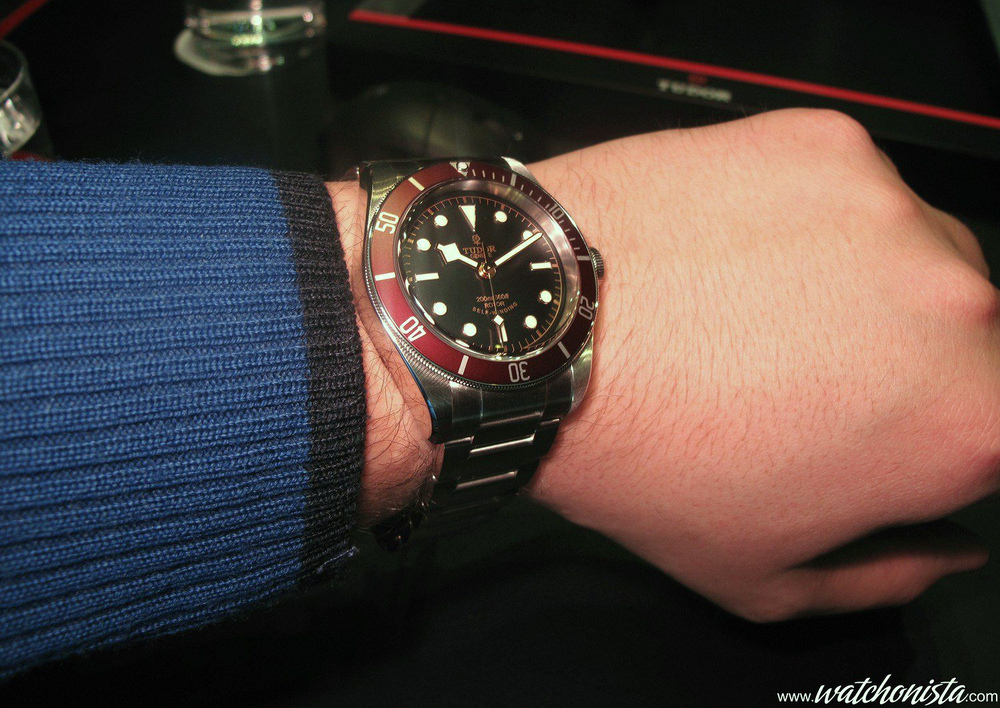
The morale is that it is far more important for a watch to "sound" vintage with charisma, than to be an impossibly perfect copy. The Black Bay keeps with another vintage code: the price, even if it fits into modern ranges. It is one of the most affordable neo-vintage watches on the market (the Longines Legend Diver is another example).
The Tudor BB will be sold for about 2400€, for the version with the aged leather strap (included the Tudor NATO), and about 2600€ with the stainless steel bracelet.
A real certified quality vintage will cost you about 10 times the price, with complimentary Becquerels.
NB: These watches are both fitted with the ETA 2824 set at 28,800v/h, with a theoretical 28-hour power reserve (by the way, Tudor communicates openly on the matter, which is rare in the industry and therefore praiseworthy)
The 2824 has the quality of its main flaw: it is very common, because of an extremely broad diffusion, and is therefore easy to maintain, from a customer service standpoint. There will be plenty of qualified people and spare parts available for a very long time.
The other bombshell presented by Tudor is the Pelagos (which means "deep sea", in Greek). While the Black Bay plays the role of the Submariner's Grandmother, the Pelagos impersonates the prodigal grandson.
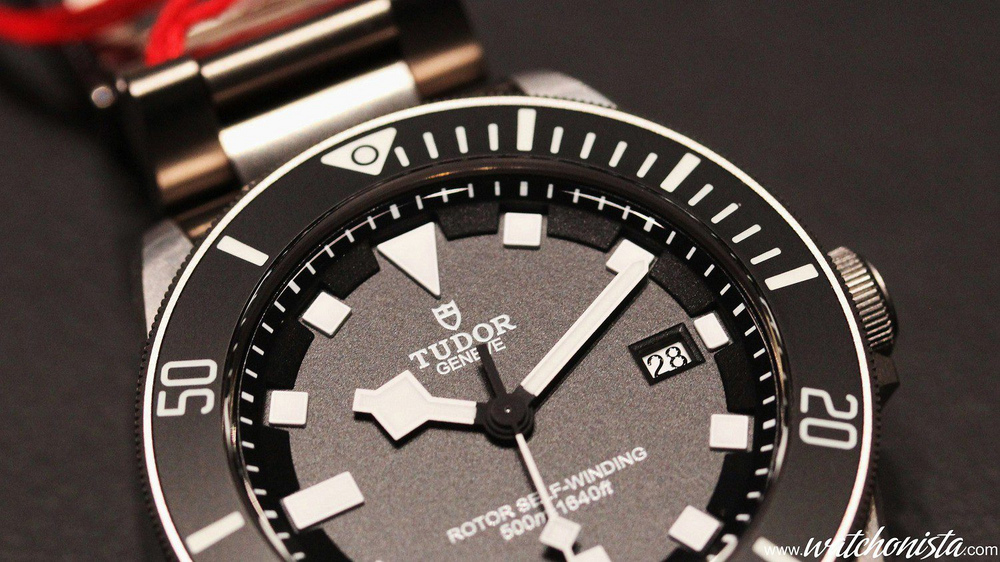
It is the super-futuristic remake of the famous vintage Tudor divers, like the "Marine Nationale".
This work is not only futuristic, but also realistic. Rather than proposing a fanciful piece with a waterproofing far beyond the best divers' abilities, Tudor focused on the functional and aesthetical aspects. For decades, the Submariner has been the main source of inspiration for some small watchmakers who lack creativity. And one has to admit that the Germans especially, and sometimes the Americans, managed to present dive watches more believable as tool-watches, than those proposed by Rolex.
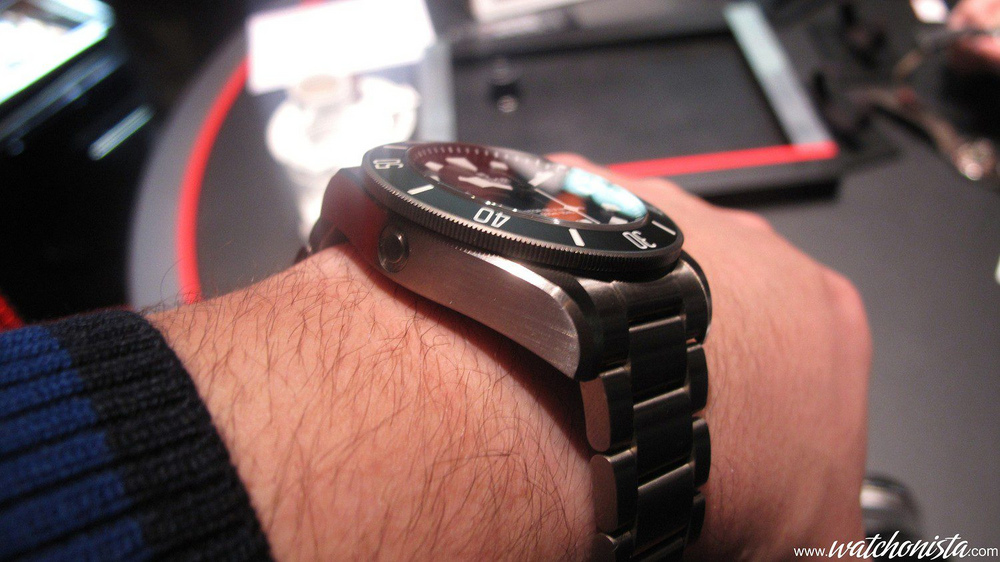
By becoming more and more of a luxury item, the Submariner gentrified. In order to outstrip the "little ones" who sometimes successfully produce some vintage Rolex, the brand had to return to basics.
The return to basics is the key to the success of this Pelagos: it is technical, super-modern in its design and its details, but most of all, it is streamlined to make way for the functionality to shine through.
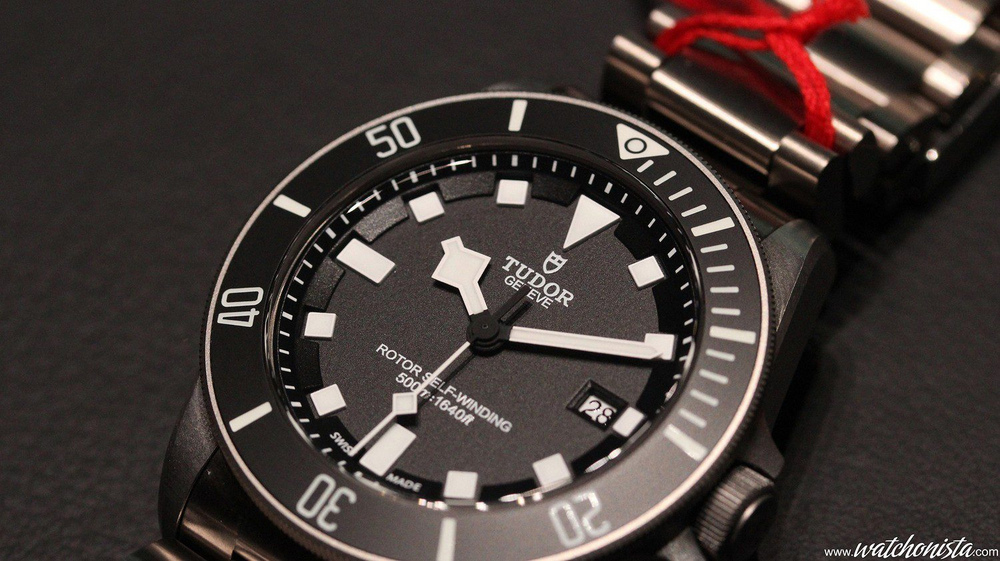
The first big surprise is that the case is made of brushed titanium: even if this material has become a classic in watchmaking, up to the point where it even replaced stainless steel in some brands, the Rolex group had almost never used it…. When it is oxidized, the titanium takes on a brownish tinge (which brings some stealth to the piece).
The matte look is also visible on the shot-peened ceramic bezel. The middles, which are almost as thick as the Black Bay's, look a bit slimmer on the Pelagos: the brushed titanium and the slightly larger casing (42mm) create this visual effect. On the crown's side, the flanges are very well designed, sharp and sober. The other side features the helium valve. This device is far from being indispensable for the leisure or semi-professional diving. Akin to many watches, it sits at 9 o'clock, a placement that disturbs a bit the case's harmony: a fitting between the lugs or at 7:30 or 10:30 would have been more subtle….
The last noteworthy detail is the titanium bracelet. Its folding strap features a series of devices that allow the bracelet to adjust to the variations of the wrist's diameter, which changes depending on the depth: the wetsuit gets thinner as the pressure increases.
But in everyday life, the desk divers' main concern is to know whether the auto-adjustment system is sensitive enough to adapt to the summer's temperatures, that is, to the swelling of the wearer's wrist.
In a few months, the lucky owners will be able to share their experiences. There is no doubt that if successful, Tudor will have found the philosopher's stone of the metal bracelet's folding strap.
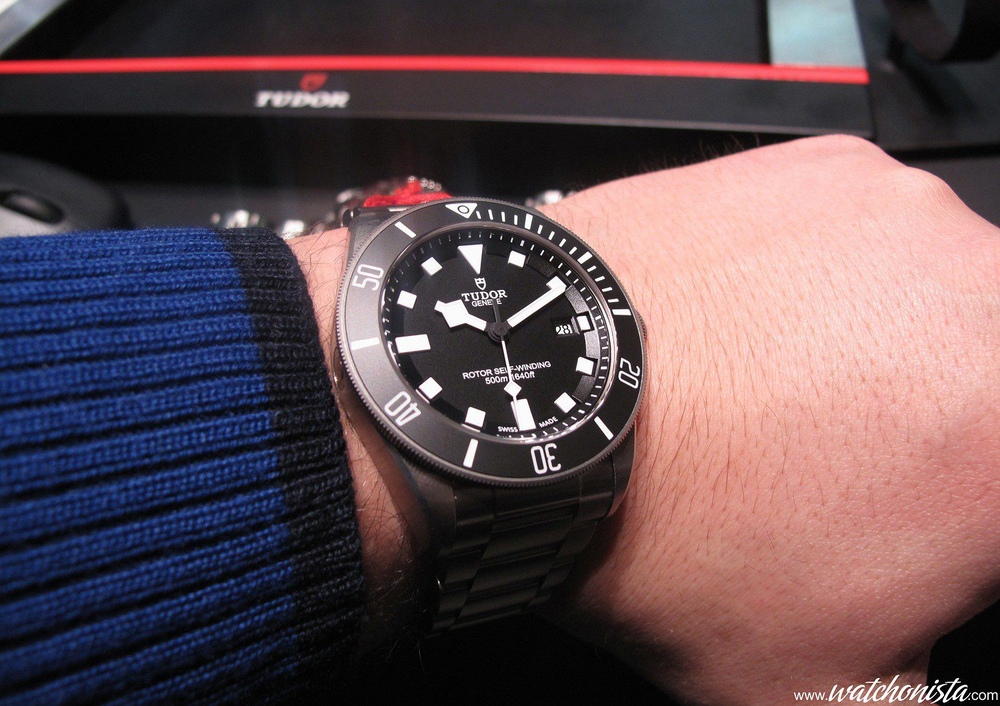
The dial gives its full meaning to the stealth and the pureness of this watch. First of all, it is absolutely matte (like the casing), and it features a beveled and crenellated chapter ring, (yes, like the Seiko Diver 200) to make room for the UNRIMMED indexes! Indexes with no metallic rim, we are not yet back to painted dials, because the indexes are bonded; but still, it is a big leap for the tool-watch lovers. The indexes are square, which matches, it seems, the superb snowflake hands (with a black finished inner part), even better!
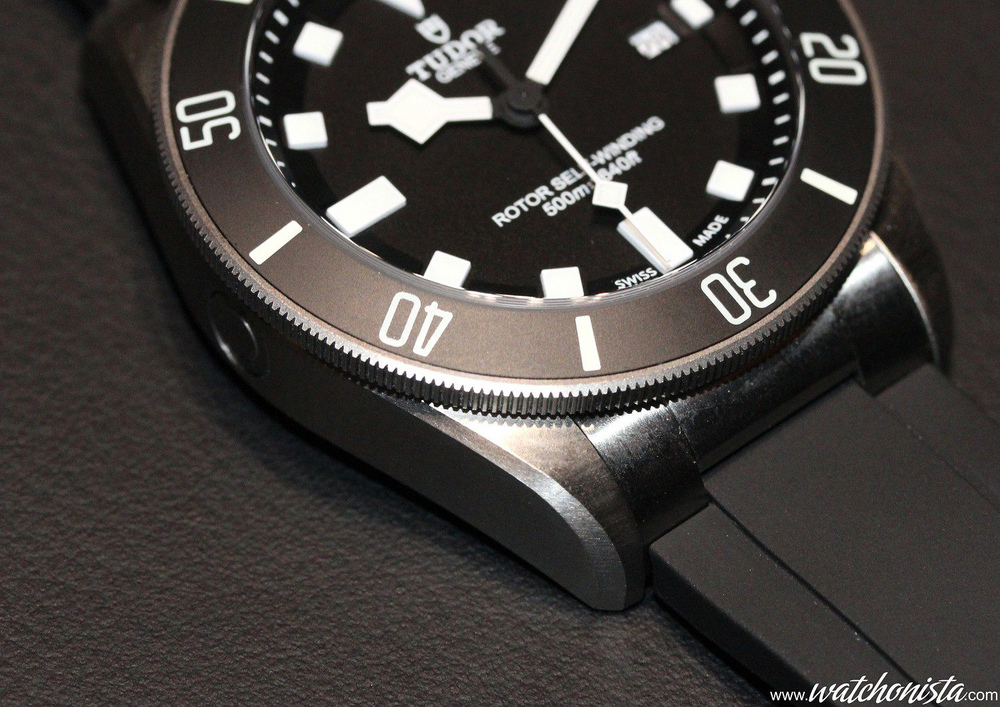
All of this in blue Lume on a black background, like the SDDS; it is pretty, it looks technical; but is the fluorescence better than with the green? It will take some testing. The watch features little lettering, which is unusual with a Submariner's dial. But most of all, the dial conveys quality, despite its lack of lust: all the details, such as the date's aperture or the chapter ring's cut outs, are very, very carefully done.
If the Black Bay is a successful tribute to the adventurers or the divers' watches from the 50's, the Pelagos is the perfect adventurer's watch from the 10's: efficient, streamlined, technical, it has all the features that make the desk divers happy. It will be available for about 3300€ with the titanium bracelet (it would be a pity not to choose this version), which is quite fair for a revived myth.
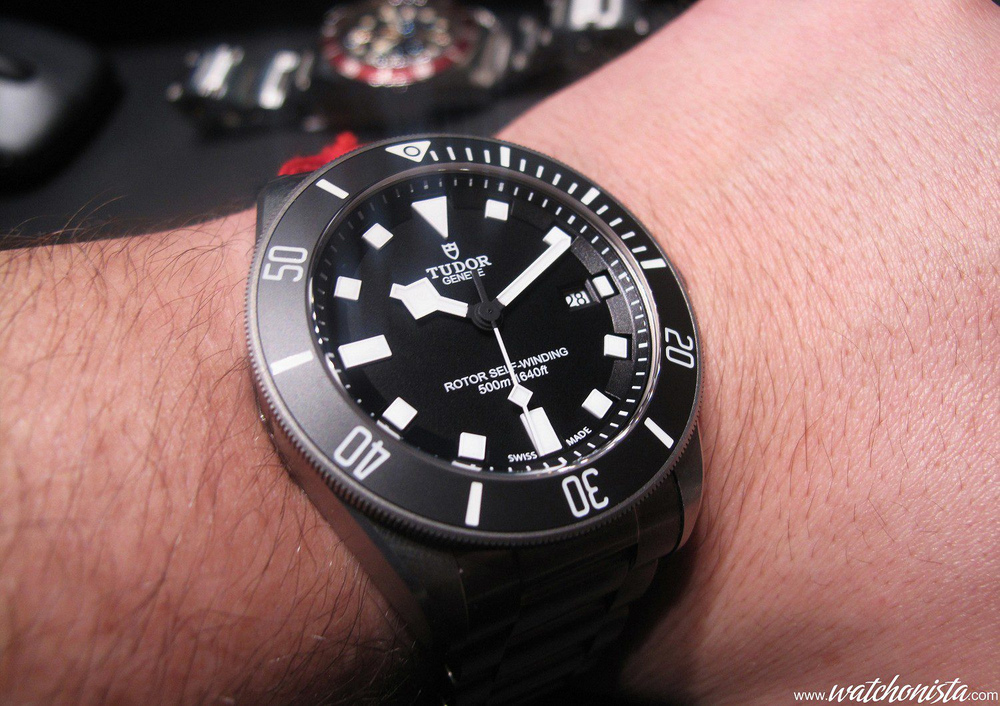
The commercial war is fought on all battlefronts, notably on the diver's; from Japan to the USA and through Eurasia, Omega, Rolex, Breitling and Tag Heuer fight each other to sell as many watches as possible, sometimes forgetting the watch lovers' simple passion.
What just happened at Tudor's is very healthy, very positive. Tudor's creative team managed to move the supertanker from Plan-les-Ouates with brilliance. These novelties, designed for the watch lovers by the watch lovers, prove that the creation and the trendy products are not the prerogatives of the independent watchmakers or of the niche-market brands…
